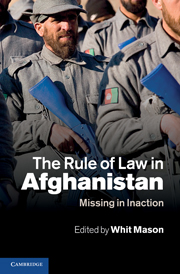Book contents
- Frontmatter
- Contents
- Contributors
- Preface and acknowledgements
- 1 Introduction
- PART I The scope and nature of the problem
- PART II The context
- PART III The political economy of opium
- PART IV Afghan approaches to security and the rule of law
- PART V International interventions
- 12 Exogenous state-building
- 13 Grasping the nettle
- 14 Lost in translation
- PART VI Kandahar
- PART VII Conclusion
- Index
- References
13 - Grasping the nettle
Facilitating change or more of the same?
Published online by Cambridge University Press: 01 June 2011
- Frontmatter
- Contents
- Contributors
- Preface and acknowledgements
- 1 Introduction
- PART I The scope and nature of the problem
- PART II The context
- PART III The political economy of opium
- PART IV Afghan approaches to security and the rule of law
- PART V International interventions
- 12 Exogenous state-building
- 13 Grasping the nettle
- 14 Lost in translation
- PART VI Kandahar
- PART VII Conclusion
- Index
- References
Summary
‘Mullah sahib, where are you going?’, someone asked Mullah Nasruddin, the stock hero of Afghan folklore, as he trotted past on a donkey. Nasruddin replied: ‘I don't know – ask the donkey.’
The London conference and the process of transition
The scale of organised electoral fraud in the 2009 presidential elections substantiated public perceptions within Western countries of Afghan government corruption that had been consistently reported in the international media over recent years. By the time the London conference brought together the Afghan government and its main international backers in January 2010, this image of systemic official corruption, along with deteriorating security, had significantly eroded public support among voters in key donor countries for continued military engagement in Afghanistan.
International political priorities, informed by a mixture of donor exhaustion and the disillusionment of domestic constituents, underpinned the declaration of a much heralded process of transition in the conference communiqué, which presented what appeared to be a clear plan on the part of the Afghan government and international community to overcome the existing security and political impasse.
Despite all the political messaging, the direction set by this plan essentially pointed to more of the same, albeit over a defined and demanding timeframe. The conference outcomes included agreement to the NATO security transition plan, which involves the transfer to Afghan-led security countrywide within five years and a drawdown of international military forces from mid-2011; the reintegration of mid to lower level armed opponents to the Afghan government; a political reconciliation process with the senior leadership of the various insurgent groups; a further increase in Afghan national police and national army numbers (134,000 and 170,000 respectively); and Afghan promises of greater government commitment to tackle corruption.
- Type
- Chapter
- Information
- The Rule of Law in AfghanistanMissing in Inaction, pp. 249 - 265Publisher: Cambridge University PressPrint publication year: 2011



